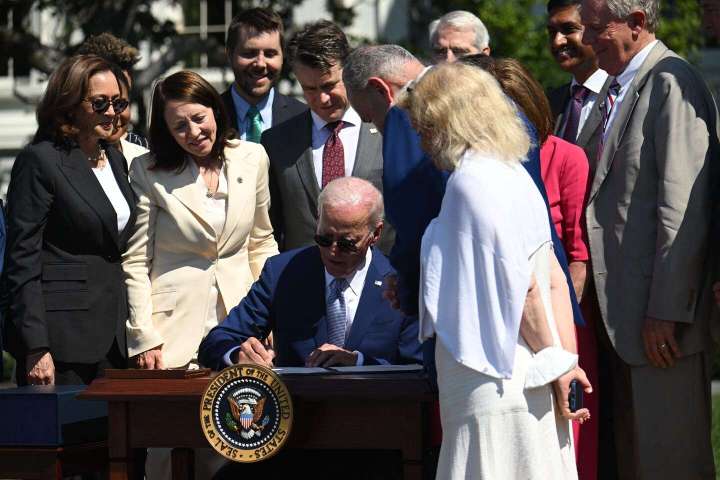President Biden on Tuesday signed legislation providing $52 billion in subsidies to the semiconductor industry, kicking off what will be one of the largest industrial development programs the federal government has ever administered.
Biden signs Chips Act, kicking off huge federal industrial initiative

The bill also authorizes tens of billions of dollars to support federal research and development and regional tech start-ups, which the administration hopes will lead to commercial breakthroughs in new fields such as quantum computing and artificial intelligence.
“Today is a day for builders. Today, America is delivering,” Biden said just before signing the legislation in a White House ceremony. “I honest to God believe that 50, 75, 100 years from now people will look back on this week, they’ll know that we met this moment.”
The subsidies come amid acute global shortages of computer chips that have hobbled automakers and other manufacturers, forcing them to cut production. The federal funds won’t solve those shortages in the short term but will incentivize big construction projects by Intel, TSMC, Micron, Samsung, GlobalFoundries and others that aim to build expensive new chip factories in the coming years.
Micron became the latest of those, announcing early Tuesday that it will spend $40 billion on new chip-manufacturing facilities in the United States through the end of the decade.
The company, based in Boise, Idaho, said the investment will create 5,000 high-tech jobs at Micron and will boost the United States’ share of global manufacturing of so-called memory chips to 10 percent from 2 percent today. Memory chips store data and are vital to new technologies such as artificial intelligence, 5G communications and cloud computing.
Micron chief executive Sanjay Mehrotra told The Post that the investment depends on the company receiving part of the $52 billion in subsidies that will become available from the new the Chips and Science Act.
“This legislation is enabling us to make investments that we would not have made otherwise in the U.S.,” Mehrotra said, adding that the new facilities would manufacture “leading edge” chips. “Without the Chips Act this production would not have been in the U.S., and that 2 percent over time would have gone down even to a smaller number.”
Micron is considering “multiple states” as the future site of the manufacturing facilities and will announce its decision in the coming weeks, he said. The company does some manufacturing in Manassas, but makes most of its chips, and all of its highest-tech chips, in Japan, Singapore and Taiwan, he said.
Computer chips, which are the brains that operate all modern electronics, have been in short supply for nearly two years amid soaring demand and a dearth of factories worldwide. Few companies have been willing to invest the billions of dollars needed to construct the factories, which are packed with some of the industrial world’s most expensive manufacturing equipment.
The shortages have undermined all types of manufacturing that rely on computer chips — most prominently auto production, which has stalled in the United States and other countries, causing shortages and soaring prices for cars.
The chip shortage has prompted countries around the world to throw billions of dollars of subsidies at manufacturers with the hope of sparking more factory construction. Because chips underpin not only consumer electronics but a variety of military gear, including F-35 fighter jets and Javelin missiles, they are seen as key to national security.
The U.S. subsidy package cleared Congress with rare bipartisan support late last month, after more than a year of wrangling that threatened to delay some factory construction projects.






